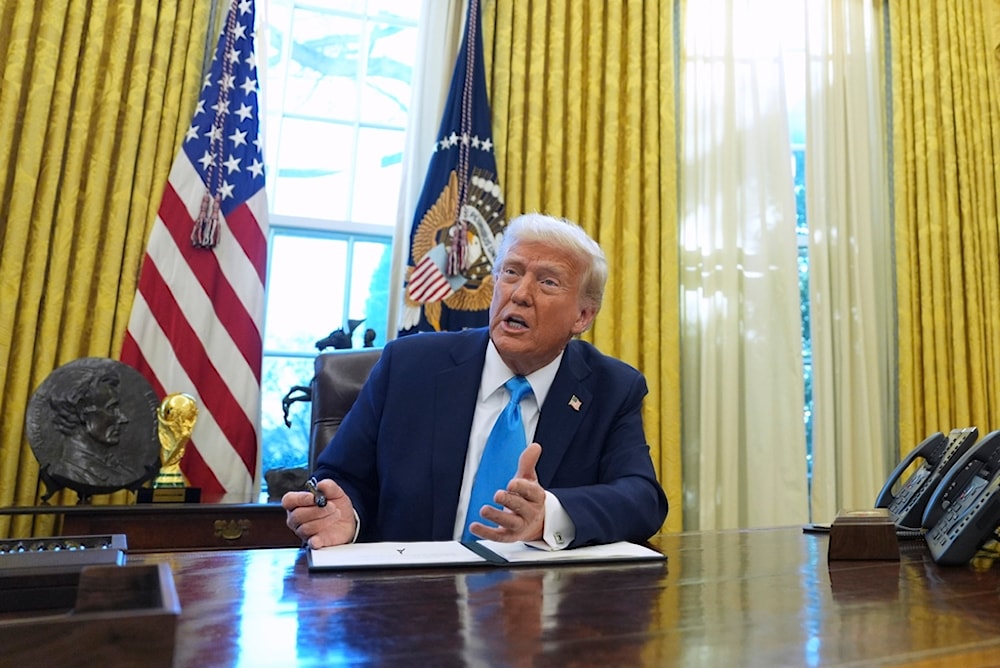Trump cuts US aid to S. Africa over land policy, 'Israel' case at ICJ
The White House revealed plans to create a pathway for the resettlement of white South African farmers, known as Afrikaners, in the US through the country's refugee admissions program.
-

FILE - President Donald Trump speaks to reporters as he signs executive orders in the White House on Tuesday, Feb. 4, 2025, in Washington (AP Photo/Evan Vucci, File)
US President Donald Trump has signed an executive order halting financial assistance to South Africa, citing concerns over its land reform policies and its legal case against "Israel" at the International Court of Justice (ICJ). The White House announced the decision on Friday, reflecting Washington's dissatisfaction with Pretoria's approach to international affairs.
According to US government data, South Africa received nearly $440 million in financial assistance from Washington in 2023. The newly signed executive order cuts this funding, with the White House pointing to South Africa's land redistribution efforts and its ICJ case against "Israel" over the Gaza genocide as primary reasons for the move.
The White House also revealed plans to create a pathway for the resettlement of white South African farmers, known as Afrikaners, in the US through the country's refugee admissions program. A statement from US officials emphasized a focus on humanitarian relief for Afrikaners, describing them as "mostly white descendants of early Dutch and French settlers."
South Africa Responds
South Africa's foreign ministry strongly criticized the executive order, calling it factually incorrect and dismissive of the country's history. "It lacks factual accuracy and fails to recognize South Africa's profound and painful history of colonialism and apartheid," the ministry said in a statement on Saturday.
Government officials also condemned the refugee provision, stating, "It is ironic that the executive order makes provision for refugee status in the US for a group in South Africa that remains amongst the most economically privileged, while vulnerable people in the US from other parts of the world are being deported and denied asylum despite real hardship."
Read more: South Africa threatens to withhold minerals amid US aid cut: FP
Land ownership remains a contentious issue in South Africa. Under colonial rule and apartheid, most farmland was allocated to white landowners. The 1950 law passed by the Afrikaner-led National Party further entrenched this system, with 85% of land designated for white ownership, displacing millions of Black South Africans.
In 2023, President Cyril Ramaphosa signed a law aimed at facilitating state-led land expropriation in the public interest. He defended the policy, stating that the government had not confiscated any land but was working to address racial imbalances in land ownership. "We will not be bullied," Ramaphosa asserted.
The White House, however, cited the land reform policy as an example of South Africa treating "certain classes of people very badly." Trump has made similar claims before but has not provided evidence to support them. Elon Musk, the South African-born billionaire and a Trump ally, has also spoken out on the issue, saying that "white South Africans have been the victims of racist ownership laws."
Diplomatic Reactions
The executive order is also linked to South Africa's international legal action against "Israel." In January 2024, South Africa filed a case at the ICJ against "Israel" for committing genocide in Gaza. The White House cited this legal challenge as evidence of South Africa's opposition to Washington and its allies. The order also referenced Pretoria's ties with Iran, another point of contention in US-South Africa relations.
AfriForum, a right-wing advocacy group, and the broader Solidarity Movement expressed appreciation for Trump's recognition of perceived injustices against Afrikaners. However, they opposed the decision to withdraw US aid, arguing that ordinary South Africans should not suffer the consequences of political disputes.
"We did not and will not ask for sanctions against South Africa or that funds for vulnerable people be cut off by the US government," said Flip Buys, Chairperson of the Solidarity Movement, as quoted by Reuters on Saturday.
Kallie Kriel, CEO of AfriForum, dismissed the idea of Afrikaners leaving South Africa, stating that their community remains rooted in the country. "We are indigenous to this country and we are going nowhere," he said.
Read more: Trump admin halts global supply of lifesaving HIV, malaria drugs

 4 Min Read
4 Min Read









